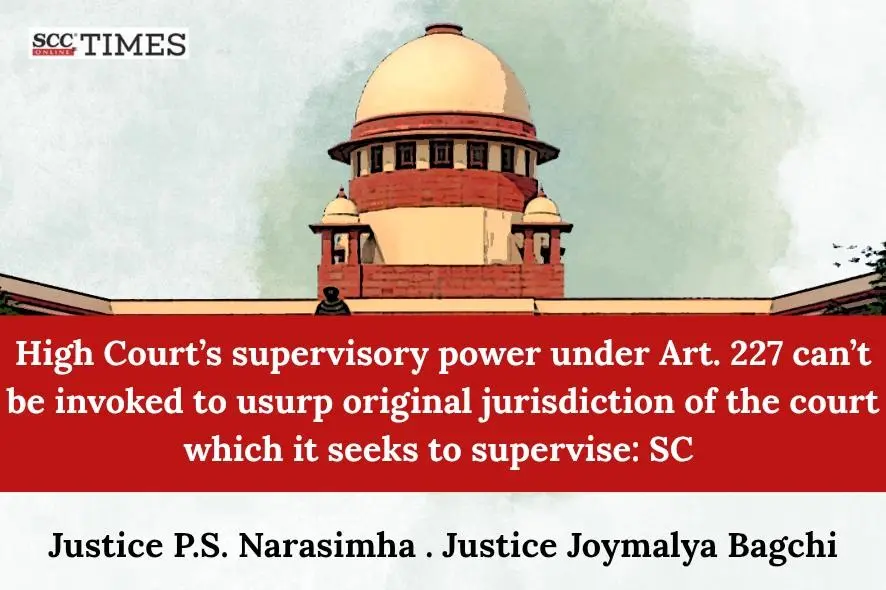Supreme Court: While considering the instant appeal wherein the question arose that whether the High Court in exercise of its supervisory jurisdiction under Article 227 of the Constitution reject a plaint? The Division Bench of P.S. Narasimha and Joymalya Bagchi*, JJ., held that essence of the power under Article 227 being supervisory, neither it can be invoked to usurp the original jurisdiction of the court which it seeks to supervise, nor can it be invoked to supplant a statutory legal remedy under the Civil Procedure Code, 1908. Illustrating with an example, the Court pointed out that existence of appellate remedy under Section 96 of the CPC operates as a near total bar to exercise of supervisory jurisdiction under Article 227 of the Constitution.
Background:
Appellants were the legal heirs i.e. wife and daughters of one K (deceased). K purchased the suit land from his own funds in the name of the respondent, who was his nephew on astrological advice. During his lifetime, K was in possession of the suit land and thereafter appellants claim to be in possession of the said land. After the death of K, disputes broke out between the appellants and sisters of K in respect of ownership of the suit land and other businesses.
The respondent initiated negotiations for sale of the suit land. This prompted the appellants to file original suit seeking a declaration regarding title and consequential injunction against the respondent from encumbering the suit land. Other lands purchased by K from his own funds in the name/joint name with other family members, were the subject matter of another suit instituted by the appellants.
The respondent petitioned under Article 227 praying for rejection of plaint in both the suits. Madras High Court via the impugned order, rejected the plaint in only the 1st suit, holding the suit is barred by law i.e. Prohibition of Benami Property Transactions Act, 1988.
Aggrieved with the afore-stated order, the appellants challenged the High Court’s jurisdiction to reject the plaint in exercise of its supervisory powers under Article 227 of the Constitution.
Court’s Assessment:
Perusing the issue, the Court pointed out that power of the High Court under Article 227 is supervisory and is exercised to ensure courts and tribunals under its supervision act within the limits of their jurisdiction conferred by law. This power is to be sparingly exercised in cases where- errors are apparent on the face of record; occasioning grave injustice by the court or tribunal assuming jurisdiction which it does not have; failing to exercise jurisdiction which it does have; or exercising its jurisdiction in a perverse manner.
The Court further pointed out that CPC is a self-contained Code and Order VII Rule 11 enumerates the circumstances in which the trial court may reject a plaint. Such rejection amounts to a deemed decree which is appealable before the High Court under Section 96 of the CPC. This statutory scheme cannot be upended by invoking supervisory jurisdiction of the High Court under Article 227 to entertain a prayer for rejection of plaint.
The Court noted that in the instant case, High Court had supervened the provisions of the CPC when it rejected the plaint on the ground it was barred by law. In doing so, the High Court not only substituted itself as the Court of First Instance but also rendered nugatory a valuable right to appeal available to the appellant had the issue been adjudicated by the Trial Court in the first place.
The Court emphasised that procedural law provides the necessary legal infrastructure on which edifice of rule of law is built. “Short-circuiting of procedure to reach hasty outcomes is an undesirable propensity of an overburdened judiciary”. Such impulses rendering procedural safeguards and substantive rights subvert certainty and consistency in law and need to be discouraged.
With the afore-stated assessment, the Court thus allowed the appeal.
[K. Valarmathi v. Kumaresan, 2025 SCC OnLine SC 985, decided on 29-4-2025]
*Judgment by Justice Joymalya Bagchi
Advocates who appeared in this case:
For Petitioner(s): Mr. M Gireesh Kumar, Adv. Mr. Ankur S. Kulkarni, AOR Mr. A S Naushad, Adv. Ms. Puspita Basak, Adv. Mr. Tarun, Adv
For Respondent(s): Ms. Aswathi M.K., AOR Mr. R. Baskaran, Sr. Adv. Mr. Arivazhagan.ac, Adv. Mr. S. Raju, Adv. Mr. V.C. Venkatachalam, Adv.



